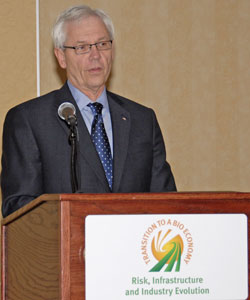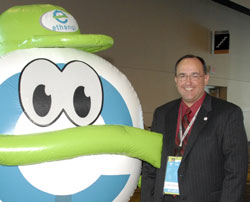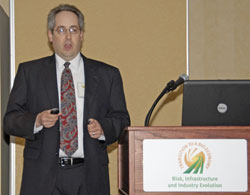 During our discussion on the infrastructure needs of a Transition To A Bio Economy, we heard from Paul Hammes, Union Pacific Railroad. Of course his focus was on rail infrastructure and as it relates to biofuels. Specifically, he spoke to the different pieces of that supply chain like rail cars, the rail network and unload/load capacity.
During our discussion on the infrastructure needs of a Transition To A Bio Economy, we heard from Paul Hammes, Union Pacific Railroad. Of course his focus was on rail infrastructure and as it relates to biofuels. Specifically, he spoke to the different pieces of that supply chain like rail cars, the rail network and unload/load capacity.
He says that the biofuels industry development happened quite quickly and that put some pressure on their network. In particular, it presented challenges at the destination markets for the unloading of ethanol. One of the challenges has been that ethanol is moved in small units and in concentrated areas. He see future challenges as developing rail infrastructure to meet capacity demands and more development at destination terminals.
You can listen to my interview with Paul here: [audio:http://www.zimmcomm.biz/farm-foundation/ff-bio-08-hammes.mp3]
You can also download the interview using this link (mp3).


 The opening speaker for day two of Farm Foundation’s Transition To A Bio Economy conference is our USDA Under Secretary for Rural Development, Thomas Dorr. He talked about rural policy and we visited for a while before the session got started.
The opening speaker for day two of Farm Foundation’s Transition To A Bio Economy conference is our USDA Under Secretary for Rural Development, Thomas Dorr. He talked about rural policy and we visited for a while before the session got started. The
The  Electric utility giant Consolidated Edison… Con Ed as it is affectionately known… announced today it will run more biodiesel in its vehicles.
Electric utility giant Consolidated Edison… Con Ed as it is affectionately known… announced today it will run more biodiesel in its vehicles. Soybean growers say their crop is being unfairly maligned in the Food-versus-Fuel debate. Members of the United Soybean Board gathered in Indianapolis, Indiana this week, and part of what they are discussing is how to counter arguments supporting that viewpoint.
Soybean growers say their crop is being unfairly maligned in the Food-versus-Fuel debate. Members of the United Soybean Board gathered in Indianapolis, Indiana this week, and part of what they are discussing is how to counter arguments supporting that viewpoint. Sarah Brechbill, Purdue University, got to put her masters degree project on the stage today here at the Farm Foundation’s Transition To A Bio Economy conference. She looked at the cost to get biomass to a plant and specifically looked at switchgrass and corn stover.
Sarah Brechbill, Purdue University, got to put her masters degree project on the stage today here at the Farm Foundation’s Transition To A Bio Economy conference. She looked at the cost to get biomass to a plant and specifically looked at switchgrass and corn stover. We hear a lot about co-products with ethanol production like the DDGS but what about in cellulosic ethanol production? Well, Danielle Julie Carrier, Arkansas State University is doing work on that subject.
We hear a lot about co-products with ethanol production like the DDGS but what about in cellulosic ethanol production? Well, Danielle Julie Carrier, Arkansas State University is doing work on that subject. During our last session of the day here at the Farm Foundation, Transition To A Bio Economy Conference, our speakers talked about some feedstock and co-product issues of ethanol production. First up was Abhishek Goel, North Dakota State University. He did work on using dry peas to supplement corn in an ethanol plant. The idea was to reduce supply risk and increase profitability.
During our last session of the day here at the Farm Foundation, Transition To A Bio Economy Conference, our speakers talked about some feedstock and co-product issues of ethanol production. First up was Abhishek Goel, North Dakota State University. He did work on using dry peas to supplement corn in an ethanol plant. The idea was to reduce supply risk and increase profitability. On the subject of locating a biorefinery we had another presentation on the subject here at the Transition To A Bio Economy conference. This one was by David Perkis, Purdue University.
On the subject of locating a biorefinery we had another presentation on the subject here at the Transition To A Bio Economy conference. This one was by David Perkis, Purdue University.